八年级(下)仁爱版 英语复习资料
仁爱英语八年级下各单元短语归纳完整版

仁爱英语八年级下各单元短语归纳集团标准化办公室:[VV986T-J682P28-JP266L8-68PNN]Unit5TopicOne1.lookexcited看起来兴奋,激动2.feelhappy/disappointed感到高兴/失望3.tastedelicious/good尝起来美味4.soundwonderful/sweet/great听起来精彩/甜美/好,不错5.smellterrible闻起来恶心6.gomad/bad发疯/变坏7.turngreen/yellow变成绿色/黄色8.bepopularwithsb.受某人欢迎9.seem(tobe)unhappy似乎不高兴10.seemtodosth.似乎做,好像做11.gotothemovies=gotoseethemovie去看电影12.invite/asksbtodosth邀请某人做某事13.invitesb.to+sp.邀请某人去/参加…14.oneof+最高级+pl.最…之一15.preparesthforsb=preparesb.sth.为某人准备好某事16.preparetodosth.准备做17.saythanks/hello/sorry/goodbyetosb向某人说声谢谢/你好/抱歉/再见18.Whatashame/pity.真遗憾。
19.get/buytheticketto/for买到…的票20.beabletodo=can/coulddo能够做…21.willbeabletodo将会做…22.onthe/one’sway to在去往…的路上23.onthewayhome/here/there在回家/去这儿/那儿的路上24.rightnow/away=atonce立即,马上25.feel/besorryfor(doing)sth为(做)某事感到抱歉/遗憾/难过26.beangrywithsb.对某人生气27.justnow=amomentago刚才(用于过去时)28.carefor=takecareof=lookafter照顾29.becauseof+n.因为…,由于…30.because+句子因为…,由于…31.cheersbup=makesb.Happy使…兴奋起来32.atlast=intheend=finally最后,最终33.attheendof…在…的末尾/尽头34.atfirst起初,开始smilingfaces笑脸35.noisychildren吵闹的孩子们36.lovelysongs活泼的歌曲37.livealone独居be/feellonely感到孤独38.teachsb.todosth.教某人做39.teachoneselfsth.=learnsth.byoneself自学…eintobeing=beborn出现,形成41.fallinto落入,掉入lookfor寻找42.everywhere=hereandthere到处43.bewithahistoryof200years=haveahistoryof200years=have200 yearsofhistory有着两百年的历史eintobeing=beborn形成efrom=befrom来自46.moreandmore+n./原级越来越来…47.be/becomeinterestedin(doing)sth.对…感兴趣48.makepeacewithsb与某人和解49.findawaytodo/ofdoingsth.找到做…的方法50.Itseems/seemedthat+句子。
英语八年下册知识点总结仁爱版(汇总8篇)

英语八年下册知识点总结仁爱版(汇总8篇)英语八年下册知识点总结仁爱版(1)【重点词组】seven-day holiday三天的假期on a visit to 去某地参观(not) to do 决定(不)做某事decide on 决定某事make a decision 做一个决定best way to do 做某事最好的方式the phone 通过电话the train tickets预订火车票hard/soft sleeper 硬/软卧money 筹集钱(借入) from 从某人那借某物lend(借出) to 把某物借给某人forward to doing 期望做某事from=get a letter from sb=receive a letter from 收到某人的来信the first day of在……第一天the top of 在……顶部cost 总花费的用法:① spend some time/money (in) doing on② pay some money for③It takes some time/money to do④ cost some moneyplaces= places of interest名胜古迹out/off 出发in trouble 有麻烦,处于困境【词形转换】安慰,抚慰安慰舒服comfortable 舒服的,安逸的加拿大Canadian 加拿大的,加拿大人的加拿大人正确的,恰当的properly 适当地。
正确地困难的difficulty [U]困难[C]各种困难【重点句型】have some exciting news to tell我有一些激动人心的消息要告诉你们。
will take us a few days to get there by骑自行车去那会花费我们几天时间。
’ d like to book some tickets to Mount我想预定一些四月十三日去泰山的票。
最新仁爱版八年级英语下册各单元知识点梳理汇总(完整版)
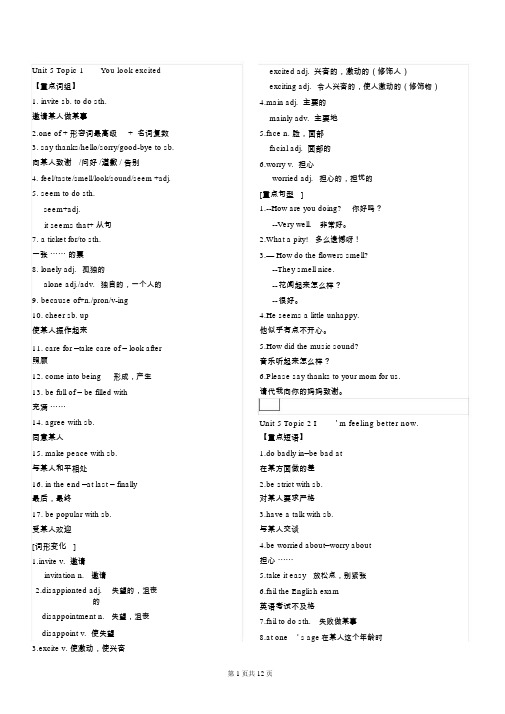
Unit 5 Topic 1You look excited 【重点词组】1. invite sb. to do sth.邀请某人做某事2.one of + 形容词最高级+ 名词复数3. say thanks/hello/sorry/good-bye to sb.向某人致谢/问好 /道歉 / 告别4.feel/taste/smell/look/sound/seem +adj.5.seem to do sth.seem+adj.it seems that+ 从句7. a ticket for/to sth.一张⋯⋯ 的票8. lonely adj.孤独的alone adj./adv.独自的,一个人的9.because of+n./pron/v-ing10.cheer sb. up使某人振作起来11. care for =take care of = look after照顾12. come into being形成,产生13. be full of = be filled with充满⋯⋯14. agree with sb.同意某人15. make peace with sb.与某人和平相处16. in the end =at last = finally最后,最终17. be popular with sb.受某人欢迎[词形变化]1.invite v. 邀请invitation n.邀请2.disappionted adj.失望的,沮丧的disappointment n.失望,沮丧disappoint v. 使失望excited adj. 兴奋的,激动的(修饰人)exciting adj.令人兴奋的,使人激动的(修饰物)4.main adj. 主要的mainly adv. 主要地5.face n. 脸,面部facial adj. 面部的6.worry v. 担心worried adj.担心的,担忧的[重点句型]1.--How are you doing?你好吗?--Very well.非常好。
仁爱八年级下册英语复习笔记。

仁爱⼋年级下册英语复习笔记。
⼋年级仁爱版英语下册知识点汇总(1)Unit 5Feeling HappyTopic1: Why all the smiling faces?1. How are you doing?=How are you? 你好吗?2 .invite sb. to do sth= ask sb. to do邀请某⼈做某事3. prepare for sth准备某事(准备时间较长思想上的准备):prepare for the exam sth for sb.为某⼈准备…:prepare food for Lilyto do sh准备做…:I prepare to go hiking.4.say sth to sb.对某⼈说….:say thanks/hello/goodbye to Peter5.系动词+adj.系表结构①be (am/is/are/was/were)②感官v.(feel, look, sound, taste品尝,smell闻、嗅)③四变化(turn/become/go/ get) *turn侧指颜⾊变化④keep, make6. Why all the smiling faces?=Why do all of you have smiling faces?7. I went to buy tickets, but there was none left. (leave-left-left)=I went to buy tickets, but there were no tickets left.*注:none 后不能直接加n. all---none; both---neither.8. a ticket to/for…⼀…的票the answer to the question问题的答案the key to the door/car/bike/… a way to…⼀种…的⽅式9. be+ adj. + 介词结构be proud of⾃豪,骄傲 e.g. The teacher is proud of his student.⼈+be pleased with+物 e.g. Jim is pleased with his new bike.物+be popular with+⼈受…的欢迎e.g. The book is popular with students.be worried about; be afraid of; be angry with; be bored with;be interested in; be nervous about; be famous for+sth/as+⾝份be satisfied with; be surprised at; be excited about/at sthbe strict with sb. be strict about/in sth10. set the table for sb.为某⼈摆餐具 e.g. I’m setting the table for guests.我希望⼀切顺利。
仁爱版英语八年级下册_期末专项复习(完形填空)

期末专项复习(一)考查内容: 八年级(下册)Unit 5~Unit 8完形填空(一)I am a lovely and happy boy. I love life. I 1 my parents, teachers, friends and classmates, and I also love my city and the world. But sometimes I am in trouble. I want to do everything 2 . I want to be a good boy. I want everyone to love me. IfI do something 3 , I'll feel unhappy. I'll think I am good for nothing and I'll be4 for some time. Then they5 tell me the following.“You can't do all things 6 than anyone else. You can't do all things at a time. You have to decide 7 comes first, and then do that. ”“You'll have to learn to accept yourself. You'll have to live with your limitations. You are just 8 . You're wonderful. It's your duty to be who you are. ”It's true that I can't make 9 good, but I'll try my best. Then I'll become myself-a 10 child. So my world will become beautiful and be full of happiness. ( ) 1. A. dislike B. love C. follow D. remember ( ) 2. A. well B. good C. bad D. nice( ) 3. A. exciting B. interesting C. wrong D. right( ) 4. A. happy B. upset C. pleased D. proud ( ) 5. A. often B. never C. seldom D. nearly ( ) 6. A. well B. good C. better D. best( ) 7. A. something B. anything C. which D. what( ) 8. A. myself B. yourself C. himself D. yourselves ( ) 9. A. other things B. nothing C. everything D. anything ( ) 10. A. funny B. lucky C. lonely D. lovely(二)At lunch time, Bonnie and Ruth sat together eating lunch as usual. Ruth and Bonnie were best friends. They 1 sandwiches, cupcakes and almost everything.But today things were different. Bonnie looked upset, and Ruth did not know why. "Why are you sad today, Bonnie? ”Ruth asked. “Because my daddy 2 his jobyesterday, ” she said. “And we may have to move. My mom and dad are very unhappy and they always argue(争吵). I am 3 .What is going to happen to us? ”Bonnie's news made Ruth very sad, too. What would life be like 4 Bonnie? What could she do to help her friend? When Ruth went home she told her mom the bad 5 .“What can I do to help? ”she asked.“I'm not sure, Ruth, ” said her mother sadly.Ruth thought and thought.“What can I do? ”she 6 .The next day was Saturday and Ruth woke up very early. She ate a quick breakfast, and then went to find her friends. They all decided to help Bonnie. The children 7 their money. They got three hundred dollars! Ruth's mom took them to the store and they bought food, soap and all kinds of things that a person might need.When they left the store they went to Bonnie's house and each of the children8 carried a bag to the door, rang the doorbell and ran. They had so much fun with9 secret surprise! They knew it would make Bonnie very happy.Ruth felt happy too, because she helped her friend. She knew it wasn't much, but all she needed to do was to show her friend that she 10 . I think Bonnie got the message, don't you?( ) 1. A. found B. made C. shared D. bought ( ) 12. A. changed B. lost C. enjoyed D. got( ) 3. A. worried B. lonely C. disappointed D. surprised ( ) 4. A. to B. with C. for D. without ( ) 5. A. story B. result C. news D. report ( ) 6. A. shouted B. laughed C. talked D. wondered ( ) 7. A. collected B. saved C. raised D. spent ( ) 18. A. usually B. quietly C. easily D. quickly ( ) 9. A. their B. his C. her D. its( ) 10. A. helped B. cared C. understood D. knew(三)We live in a busy world, so we really need to relax ourselves. But how to take a break when you can't get a vacation? Please take these 1 .Action One: Turn offWhen you are falling asleep, maybe there are some devices(设备)around you. It is one of the 2 why you can't have a good night's sleep. It's also why you can 3 awake(醒着的)in bed for hours, and wake up in a bad mood. So don't use any device 4 an hour before bed-turn them off.Action Two: Have your own timeA great way to avoid stress is to make sure you have some time just for 5 daily. You may read something interesting, listen to music, or just drink your coffee slowly and do 6 . It's your 7 time and no one can take it from you.Action Three: Meditate(冥想)It doesn't need to 8 a long time. You may just sit for 2 minutes and try to empty(清空)your mind. It can help your heart jump more slowly. It 9 makes your body in a good condition. So give it a try.That's 10 you can be relaxed and comfortable without having to take a vacation.( ) 1. A. ideas B. actions C. rules D. questions( ) 2. A. reasons B. facts C. result D. ways( ) 13. A. make B. come C. look D. stay( ) 4. A. less than B. more than C. at least D. at last( ) 5. A. myself B. yourself C. ourselves D. themselves ( ) 16. A. nothing B. anything C. everything D. something( ) 7. A. busy B. work C, free D. business( ) 8. A. take B. spend C. cost D. use( ) 9. A. too B. either C. never D. also( ) 10. A. why B. what C. when D. how(四)Clothes are important in our life. Different people wear 1 clothes. Now let's2 some people talking about clothes.Hello, my name's Betty. I started working this year, so I'm able to get new clothes more often 3 before. There are different people in my working place every day. If someone sees me in 4 once, I don't like to go out in it again. I like to wear bright colors and always dress up when I go to parties. I buy all kinds of clothes and I try to follow the latest way of 5 .Hi, I'm Jack. I don't have much to say about clothes. Shopping 6 clothes isn't really the way of life I'm interested in. Since I'm still at a college, I don't really mind7 . I have two jackets and I often wear 8 . I know least about the way of dressing.I don't like the serious look.My name is Alice. I'd like to say that my clothes have to be comfortable and make me 9 easy as soon as I put them on. Sometimes I buy clothes in some small markets-they're less expensive there. I go shopping for clothes about once a month, though. If I see 10 and fit for me, I would maybe go for it there and then.( ) 1. A. the same B. different C. beautiful D. comfortable ( ) 2. A. listen to B. hear C. to listen to D. to hear( ) 3. A. as B. like C. than D. long( ) 4. A. something B. anything C. nothing D. everything( ) 5. A. dress B. dressing C. dresses D. to dress( ) 6. A. of B. in C. for D. on( ) 7. A. what I wear B. what do I wear C. what I wore D. what did I wear ( ) 8. A. it B. them C. their D. they( ) 9. A. feel B. feels C. feeling D. to feel( ) 10. A. something comfortable B. anything comfortableC. comfortable somethingD. comfortable anything(五)Traffic rules help to keep order on the road. They also help to keeppeople__1__.The pedestrian(行人)has as many rules to__2__as the driver of a car. You shouldwalk on the sidewalk(人行道)or at the side of the road. Always look__3__before you walk across the street.If you like riding a bike, don't ride in the middle of the road or run__4__red traffic lights. When you ride a bike with a friend, don't look around or talk. If you drive a car, you should__5__at the traffic lights. You must always__6__a seat belt(安全带). Without belts__7__the driver and the passengers may be badly hurt in a sudden accident.You may not need to take a bus, but__8__if you have to travel in one. Get on or get off a bus only when it comes to a__9__. When it is full, don't try to get inside__10__you may fall off.Traffic rules are also called Road Safety rules. The maxim(格言)for all road users is “ Thinking ab out others”.( ) 1. A. healthy B. safe C. happy D. careful( ) 2. A. follow B. make C. break D. pass( ) 13. A. happy B. happily C. careful D. carefully( ) 4. A. through B. across C. along D. around( ) 5. A. speed up B. go ahead C. get off D. slow down( ) 6. A. take B. wear C. carry D. bring( ) 7. A. half B. none C. both D. all( ) 8. A. look around B. lake care C. take a seat D. look back( ) 9. A. sign B. stop C. corner D. crossing( ) 10. A. and B. so C. or D. but(六)I'm taking my family to other countries to have a trip. We are going by train 1 New York, and then take a ship to Europe. When we __2__ in Europe, we're going to some countries for sightseeing. We'll go to places__3__by train or by bus. We are planning to fly home.It __4__ us a long time to decide where to go, but I think we have planned a very __5__ tip. We will go to England, France and Italy. My wife is very interested in __6__ to France because she is a teacher of French. And my brother is looking __7__to a trip to Italy because he speaks Italian very well.We also __8__ about how we would go to Europe. At first we wanted to fly because it would be __9__ and would save more time. But my brother likes to take a boat trip and the children __10__ that, too. What do you think of my trip?( ) 1. A. to B. for C. in D. at( ) 2. A. got B. reach C. arrive D. get( ) 3. A. also B. too C. either D. neither( ) 4. A. paid B. took C. spent D. cost( ) 5. A. pleasure B. interested C. interest D. interesting( ) 16. A. looking B. going C. coming D. seeing( ) 7. A. forward B. after C. over D. for( ) 8. A. spoke B. told C. said D. talked( ) 9. A. faster B. fast C. quickly D. more quickly ( ) 10. A. have B. liked C. enjoy D. enjoyed(七)Many Americans like to have their holidays in__1__countries. One day an American__2__comes to China. This is her first time to China and she wants to__3__some friends there. She meets a Chinese. This Chinese wants to talk__4__with the American. When he sees her, he comes up and says“__5__”to her, then he begins his first talk with someone__6__an English-speaking country. “How old are you? ” the Chinese__7__. “ I'm__8__. Please don't ask a lady(女士)about her__9__, ” answers the woman. The Chinese is surprised. He doesn't know__10__. Can you help him?( ) 1. A. another B. the other C. other D. others( ) 2. A. man B. boy C. woman D. child( ) 3. A. make B. making C. having D. do( ) 4. A. with English B. with Chinese C. in English D. in Chinese ( ) 5. A. OK B. Hello C. Sorry D. Goodbye ( ) 6. A. in B. at C. of D. from( ) 7. A. says B. tells C. talks D. speaks( ) 8. A. sure B. worried C. glad D. sorry( ) 9. A. supper B. age C. job D. family( ) 10. A. how B. why C. what D. which(八)There was once a man who was very rich but very tightfisted(吝啬的)at the same time. Nobody__1__him in the village. One day he said to them, “I know you don't like me. When I__2__, I will give everything to you. Then everyone will be__3__. ”Even then nobody believed him. The rich man couldn't__4__why they didn't believe him. One day he went for a walk. Under a tree he happened to hear a pig and a cow__5__.The pig said to the cow, "Everybody likes you__6__nobody likes me. Why? When I provide people with meat, ham(火腿)and so on, I give three or four things to them. But you give only one thing-milk. Why do people like you__7__but not me? ”The cow answered, "Look, I give them milk while I'm__8__. They see that I am generous(慷慨的)with what I__9__. But you don't give them anything while you're alive. Only after you're dead do you give them meat, ham and so on. People don't believe in the__10__, they believe in the present(现在). If you give while you are alive, people will like you. "From that moment on, the rich man wasn't tightfisted any more. Everyone began to like him. And he felt quite happy.( ) 1. A. believed B. liked C. hated D. knew ( ) 2. A. die B. leave C. return D. arrive ( ) 3. A. frightened B. happy C. angry D. safe ( ) 4. A. agree B. understand C. remember D. forget ( ) 5. A. crying B. laughing C. singing D. talking ( ) 6. A. because B. so C. but D. or( ) 7. A. sometimes B. all the time C. at the beginning D. in the end ( ) 8. A. alive B. dead C. busy D. free ( ) 9. A. like B. have C. eat D. say( ) 10. A. lifetime B. competition C. friendship D. future期末专项复习(一)答案(一)1. B【解析】下文中有一个also说明这里指的也是同一种情况, 下文的动词是love, 所以这里也选love。
八年级下册仁爱英语知识点

八年级下册仁爱英语知识点八年级下册仁爱英语知识点大全go out for dinner 出去吃饭stay out late 在外面待到很晚go to the movies 去看电影get a ride 搭车work on 从事finish doing sth. 完成做某事clean and tid y 干净整洁do the dishes 洗餐具take out the rubbish 倒垃圾fold your/the clothes 叠衣服sweep the floor 扫地make your/the bed 整理床铺clean the livng room 打扫客厅no problem 没问题welcome sb. 欢迎某人come home fro m school/ work放学/下班回家throw down 扔下sit down 坐下come over 过来take sb. for a walk 带某人去散步all the time 一直;总是all day/evening 整曰/夜do housew ork 做家务shout back 大声回应walk away 走开.share the housework 分担家务a com fortable home 一个舒适的家in surprise 惊讶地get som ething to drin k 拿点喝的东西watch one show 观看一个节目hang out 闲逛pass sb. sth. 把某物传给某人lend sb. sth. 把某物借给某人get sth. wet 使某物弄湿hate to do sth. 讨厌做某事do chores 做杂务help sb. (to ) d o /with sth帮助某人干某事bring a tent带顶帐篷来buy some snacks买些小吃go to the store去商店invite sb. to a party邀请某人参加聚会make sb. do sth. 使某人做某事enough stress足够的压力awaste of tim e浪费时间in order to为了get good grades取得好成绩m ind doing sth. 介意做某事depend on依赖;依靠develop c h ild re n ’ s independence发展孩子的独立性look after/take care of 照顾;照看do one’ s part in (doin g ) sth.做某人分内的事八年级英语Unit3单元知识点:重点句型1. Could you please…..do sth. ?Could you please clean your room?你能整理一下你的房间吗?2. I have to do some work.我必须干些活。
八下英语仁爱版知识点总结

八下英语仁爱版知识点总结Unit 1: Getting to Know Each Other.Greetings and Introductions: Hello, goodbye, nice to meet you, my name is..., what's your name?, where are you from?, I'm from..., how are you?, I'm fine, thank you.Personal Information: name, age, birthday, address, phone number, email address, nationality, favorite color, favorite food, favorite subject, hobbies.Making Friends: asking questions to get to know someone, finding common interests, being friendly and approachable.Unit 2: My Family and Friends.Family Members: father, mother, brother, sister, grandparents, aunts, uncles, cousins.Describing Family Members: age, appearance, personality,occupation, hobbies.Friends: best friends, close friends, classmates, neighbors, online friends.Describing Friends: appearance, personality, interests, how you met them.Unit 3: My School Life.School Subjects: English, math, science, history, geography, music, art, physical education.School Activities: attending classes, taking notes, doing homework, studying for tests, participating in extracurricular activities.School Rules and Regulations: uniforms, attendance, behavior, discipline.School Events: school trips, sports events, cultural performances, graduation ceremonies.Unit 4: Where I Live.Types of Houses: houses, apartments, villas, bungalows, mansions.Parts of a House: living room, kitchen, bedroom, bathroom, garden.Describing a House: size, location, number of rooms, amenities, appearance.Neighborhood: neighbors, local businesses, parks, schools, hospitals.Unit 5: Daily Life.Daily Routine: waking up, getting dressed, eating breakfast, going to school, doing homework, playing, watching TV, going to bed.Food and Drinks: breakfast, lunch, dinner, snacks,fruits, vegetables, meat, fish, drinks.Clothing: types of clothes, colors, patterns, sizes, styles.Unit 6: My Town or City.Landmarks: famous buildings, monuments, statues, bridges.Public Places: parks, squares, museums, libraries, shopping malls, hospitals.Transportation: buses, trains, cars, taxis, bicycles.People and Culture: local customs, traditions, festivals, food.Unit 7: Travel and Adventure.Travel Destinations: countries, cities, tourist attractions.Travel Activities: sightseeing, shopping, dining, hiking, swimming.Transportation: planes, trains, buses, cars.Travel Tips: packing, getting around, staying safe.Unit 8: The Natural World.Animals: mammals, birds, fish, reptiles, amphibians.Plants: flowers, trees, shrubs, fruits, vegetables.Natural Resources: water, forests, minerals, oil, gas.Environmental Issues: pollution, climate change, deforestation.Unit 9: Science and Technology.Inventions: telephone, computer, microscope, television,airplane.Scientists: Albert Einstein, Marie Curie, Isaac Newton, Charles Darwin.Scientific Experiments: conducting experiments, collecting data, analyzing results.Technological Advancements: smart phones, laptops, tablets, artificial intelligence.Unit 10: The World Around Us.Countries of the World: continents, countries, capitals.Cultures of the World: languages, religions, traditions, customs.Global Issues: poverty, hunger, war, climate change.International Cooperation: United Nations, Red Cross, Doctors Without Borders.。
仁爱八年级下英语知识点

仁爱八年级下英语知识点英语作为国际通用语言,对于现代人的职业发展和日常交流都极其重要。
在仁爱八年级下,我们将从听说读写四个方面,全面学习英语知识点。
语法知识1. 直述句(陈述句)主语+谓语+宾语例句:She loves ice cream.2. 疑问句(一般疑问句)助动词+主语+谓语+宾语例句:Do you like pizza?3. 祈使句(命令句)动词原形+宾语例句:Clean your room.4. 句子成分(主语、谓语、宾语、定语、状语等)例句:The boy with glasses is my friend.口语表达1. 自我介绍例句:Hello, my name is Jack. I am from Shanghai.2. 意见交流例句:What do you think of this movie?3. 问路例句:Excuse me, where is the nearest bank?4. 约会例句:Would you like to have dinner with me tonight?听力训练1. 美国口音和英国口音的区别2. 不同场景下的英语口语表达3. 对话中正确听取数字、时间等4. 听取简单的新闻或者广播等阅读理解1. 阅读基础知识(字母、数字、大小写)2. 阅读简单的短文,了解文章基本内容3. 阅读故事和小说,理解情节和人物关系4. 阅读新闻等实用文章,了解时事信息写作能力1. 自我介绍2. 写日记、周记、月记等3. 写作文,例如:写一篇关于影响健康的因素的文章4. 写简历,求职信等总结仁爱八年级下英语知识点包含了很多方面,包括语法、口语、听力、阅读和写作等,我们需要在日常学习中逐步积累和运用这些知识点。
只有通过反复的练习和实践,我们才能真正掌握英语知识,使其成为我们通往更广阔世界的一把钥匙。
专题05 时间状语从句-八年级英语下期末专项复习(仁爱版)

专题05 时间状语从句第一部分语法1. 引导时间状语从句的连词2. when,while,as引导时间状语从句的区别when,while,as显然都可以引导时间状语从句,但用法区别非常大。
①when可以和延续性动词连用,也可以和短暂性动词连用;而while和as只能和延续性动词连用。
Why do you want a new job when you’ve got such a good one already?你已经找到如此好的工作,为何还想再找新的?(get为短暂性动词)Sorry, I was out when you called me.对不起,你打电话时我刚好外出了。
(call为短暂性动词)Strike while the iron is hot.趁热打铁。
(is为延续性动词,表示一种持续的状态)The students took notes as they listened.学生们边听课边做笔记。
(listen为延续性动词)②when从句的谓语动词可以在主句谓语动作之前、之后或同时发生;while和as从句的谓语动作必须是和主句谓语动作同时发生。
a. 从句动作在主句动作前发生,只用when。
When he had finished his homework, he took a short rest. (finished先发生)当他完成作业后,他休息了一会儿。
When I got to the airport, the guests had left. (got to后发生)当我赶到飞机场时,客人们已经离开了。
b. 从句动作和主句动作同时发生,且从句动作为延续性动词时,when,while,as都可使用。
①When / While / As we were dancing, a stranger came in. (dance为延续性动词)当我们跳舞时,一位陌生人走了进来。
②When / While / As she was making a phonecall, I was writing a letter. (make为延续性动词)当她在打电话时,我正在写信。
仁爱版八年级英语下学期重点单词-期中知识点复习:Unit 5-Unit 6)
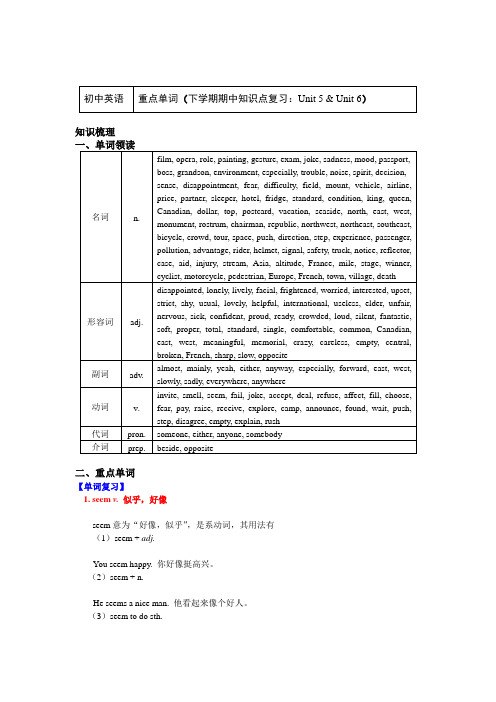
知识梳理二、重点单词【单词复习】1. seem v.似乎,好像seem意为“好像,似乎”,是系动词,其用法有(1)seem + adj.You seem happy. 你好像挺高兴。
(2)seem + n.He seems a nice man. 他看起来像个好人。
(3)seem to do sth.They seem to know what they’re doin g. 看来他们知道自己在干什么。
(4)seem + that从句It seems that they know everything. 好像他们无所不知。
—Miss Wang ___________ very angry. What’s the matter, do you know?—Two boys had a fight in her class.A. soundsB. seemsC. smellsD. tastes答案:B思路分析:这四个词都可作连系动词。
sound“听起来”,seem“似乎,好像”,taste“尝起来”,smell“闻起来”。
由句意可知王老师似乎很生气,故选B。
2. either adv.也either作副词时,意思是“也”,只能放在否定句的句尾。
He can’t swim. I can’t, either. 他不会游泳,我也不会。
(1)either adj.“两者中的任何一个”。
You may use either telephone. 两部电话随你用哪一部。
(2)either conj.“两者中的任何一个”。
—Which would you like, tea or coffee? 你要茶还是咖啡?—Either is OK. 任何一个都行。
(3)either conj. 常与or连用,意为“或者……或者……;要么……要么……”。
Either your watch or mine is wrong.不是你的表不准,就是我的不准。
仁爱英语八年级下册u5t1知识点

仁爱英语八年级下册u5t1知识点《仁爱英语八年级下册U5T1知识点》第一部分:单词学习1. animation:动画2. cartoon:卡通3. character:角色,人物4. director:导演5. genre:类型,体裁6. plot:剧情7. soundtrack:电影配乐8. sequel:续集9. protagonist:主角10. series:系列第二部分:词组学习1. be based on:以……为基础2. be set in:以……为背景3. break into:闯入,进入4. come up with:想出5. have a crush on:喜欢上6. make up:组成,化妆7. stand out:突出,显眼8. take place:发生9. take up:开始从事,占用10. turn out:最终成为,结果是第三部分:语法学习1. 过去进行时:表示过去某个时间正在进行的动作。
例如:I was watching TV at 8 o'clock yesterday evening.2. 现在完成进行时:表示过去某个时间开始进行的动作一直持续到现在,并且可能会继续进行下去。
例如:I have been studying English for three years.3. 引导时间状语从句的词语:when,while,as,before,after,since,until,等等。
例如:I will call you when I arrive there.第四部分:阅读理解The Incredibles is a movie about a family of superheroes. It was produced by Pixar Animation Studios and directed by Brad Bird. The film was released in 2004 and was a huge success. It won two Academy Awards and grossed over $600 million worldwide.The plot is about a family of superheroes whose powers are banned by the government. Mr. Incredible and Elastigirl decide to retire and raise their children. However, Mr. Incredible is approached by a mysterious woman who offers him a job, but things don't go as planned and the family has to band together to save the day.The film received critical acclaim for its storytelling, animation, and memorable characters. It also spawned a sequel, which was released in 2018 and was also a success.1. What is The Incredibles about?2. Who produced The Incredibles?3. When was The Incredibles released?4. What did The Incredibles win?5. Is there a sequel to The Incredibles?答案:1. The Incredibles is a movie about a family of superheroes.2. The Incredibles was produced by Pixar Animation Studios.3. The Incredibles was released in 2004.4. The Incredibles won two Academy Awards.5. Yes, there is a sequel to The Incredibles.。
仁爱版八年级下英语期中知识点复习
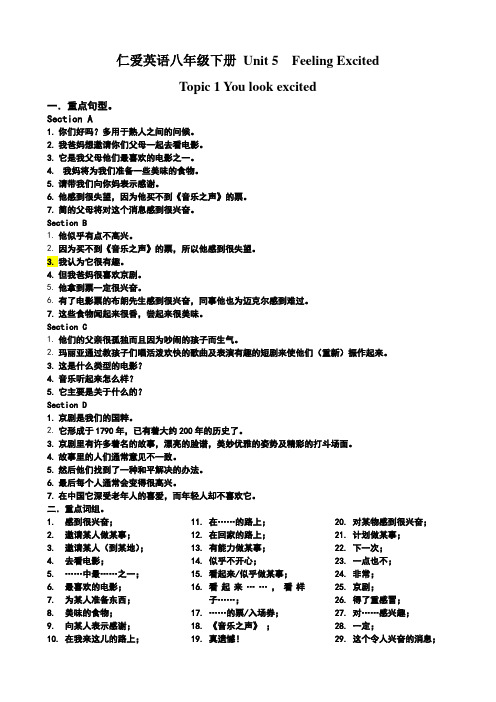
仁爱英语八年级下册Unit 5 Feeling ExcitedTopic 1 You look excited一.重点句型。
Section A1.你们好吗?多用于熟人之间的问候。
2.我爸妈想邀请你们父母一起去看电影。
3.它是我父母他们最喜欢的电影之一。
4.我妈将为我们准备一些美味的食物。
5.请带我们向你妈表示感谢。
6.他感到很失望,因为他买不到《音乐之声》的票。
7.简的父母将对这个消息感到很兴奋。
Section B1.他似乎有点不高兴。
2.因为买不到《音乐之声》的票,所以他感到很失望。
3.我认为它很有趣。
4.但我爸妈很喜欢京剧。
5.他拿到票一定很兴奋。
6.有了电影票的布朗先生感到很兴奋,同事他也为迈克尔感到难过。
7.这些食物闻起来很香,尝起来很美味。
Section C1.他们的父亲很孤独而且因为吵闹的孩子而生气。
2.玛丽亚通过教孩子们唱活泼欢快的歌曲及表演有趣的短剧来使他们(重新)振作起来。
3.这是什么类型的电影?4.音乐听起来怎么样?5.它主要是关于什么的?Section D1.京剧是我们的国粹。
2.它形成于1790年,已有着大约200年的历史了。
3.京剧里有许多着名的故事,漂亮的脸谱,美妙优雅的姿势及精彩的打斗场面。
4.故事里的人们通常意见不一致。
5.然后他们找到了一种和平解决的办法。
6.最后每个人通常会变得很高兴。
7.在中国它深受老年人的喜爱,而年轻人却不喜欢它。
二.重点词组。
1.感到很兴奋;2.邀请某人做某事;3.邀请某人(到某地);4.去看电影;5.……中最……之一;6.最喜欢的电影;7.为某人准备东西;8.美味的食物;9.向某人表示感谢;10.在我来这儿的路上;11.在……的路上;12.在回家的路上;13.有能力做某事;14.似乎不开心;15.看起来/似乎做某事;16.看起来……,看样子……;17.……的票/入场券;18.《音乐之声》;19.真遗憾!20.对某物感到很兴奋;21.计划做某事;22.下一次;23.一点也不;24.非常;25.京剧;26.得了重感冒;27.对……感兴趣;28.一定;29.这个令人兴奋的消息;30.马上;31.为某人感到难过;32.对于某事很遗憾;33.做某事很遗憾;34.……很遗憾;35.最受欢迎的美国电影之一;36.照顾;37.因为;(介词短语)38.因为;(连词)39.吵闹的孩子;40.教某人某事;41.教某人做某事;42.唱活泼欢快的歌曲;43.表演有趣的短剧;44.使……振奋起来,使……高兴起来;45.为……加油;46.发疯;47.首先,起初;48.他孩子们的笑脸;49.国粹;50.形成;51.拥有……的历史;52.充满,装满;53.四个主要角色;54.着名的故事,漂亮的脸谱,美妙优雅的姿势及精彩的打斗场面。
[原创归纳]仁爱版八年级下英语语法归纳
![[原创归纳]仁爱版八年级下英语语法归纳](https://img.taocdn.com/s3/m/8d95b6f58ad63186bceb19e8b8f67c1cfad6eed0.png)
初二年下册英语语法归纳(仁爱版)【2】Unit5Topic1SectionA2.1nvitesb./todosth.邀请或人做某事;Invitesb.\+地点邀请或人去某地.3.Prepare...for...=getreadyfor...为预备.4.Saythankstosb.向或人道谢. SectionBl.Aticketto\for的票.2.Beabletodosth...=can有才能做某事.但是can一般用于如今时和曩昔时而beableto可以用于任何时态・3................................................................................ Ringsb.up打德律风给或人.4.Beproudof以自满.5.Bepleasedwith.对..满足.SectionC1.Careabout关怀;Care+从句省略about2.Getmarriedtosb.=marrysb.与或人娶亲.3.关于消费:Sth.Costsb.+钱;Sb.spend+时\钱in.onsth.'doingsth.Ittakesb\时todosth.;Sb.pay钱forsth.4.Beon上映.5.Cheerup使振作.6.What...for=why.(白话)SectionDeintobeing形成.2.Befullof=befilledwith充满.3.......................... Endwith以结尾.4.Makepeacewithsb.与或人媾和.Unit5Topic2SectionA1.Seem/todosth.似乎做某事.\adj作表语.;Itseemthat+从句.2.Havetalkwithsb.与或人攀谈.3.Bestrictwithsb.对或人严厉.SectionBl.Failtodosth.掉败,做不到某事.2.Atone'sage.在年纪时3.Attheageof.在岁时4.Makesb.todosth让或人做某事.As+adj\adv原级+as与一样;Notas\so+adj\adv原级+as与不一样.6.Be\getusedtodoingsth.习惯做某事;Usedtodosth.曩昔习惯做某事.SectionC 1.Beafraidofdoingsth.畏惧做某事.2.Dealwith=dowith.处理.4.Refusetodosth.谢绝做某事.5.Eventhough=even讦即使.6.Not...anylonger=nolonger不再.7.Fallasleep入睡.8.Inone'steens在或人的时期.9.Give.ahand=dosb.afavor=helpsb.给或人关心.10.比较级+and+比较级越来越程度递增.The+比较级...The+比较级…越越两种情形同时变.11.原因状语从句.Unit5Topic3SectionA1.Have\has+动词曩昔分词.如今完成时.2.Can'tbe确定不是,否认推想.3.Mustbe必定是,确定推想.4.Maybe可能是,猜测推想.5.Attheendof...在…的最后;Intheendof...最后.6・That\it's+adj+foi\tobdosth.7.1nsteadof+n.\v\代…代替8.Taketurnstodosth.=taketurnsatdoingsth.=dobyturns轮流做某事.SectionB 1......................................... B ebad\good for...对有害\益.2661alongwithsb\sth与相处得好.3.Justas似乎.4.Smileat\tosb.\sth.微笑面临或人.某事;Smile,微笑(没有声音);Laugh,大笑(有声音),Laughatsb.取笑或人.5.Giveasurprisetosb=givesbasurprise给或人一个惊喜.6.0ntheone'swayto...在或人去的路上;后接副词则省去to.SectionC1.世界上举世无双的事物前加定冠词the2.Hadbetterdosth\notdosth.最好做某事.不要做某事.SectionD1.Getbacktosth持续回到某事上.Unit6topic1l.Goonavisitto...去旅游.参不雅.2.1t'shatetosay这很难说.3.Decidetodosth决议做某事.4.Make(take)adecide下决议.5.Decideon\upon决议.SectionBl.Ticketat+钱+for...票的价钱.2・具体某一天的早・中・晚上,前用介词on・SectionCeupwith…想出.2.Lookforwardtosth\doingsth.愿望某事.愿望做某事.3.Hearfromsb收到或人来信.SectionD动词不定式1•根本情势:to+动词本相(确定情势)Notto+动词本相(否认情势)2・特点:没有人称和数的变化・3・常用句型:It's+adj+todosth.Too+adj+todosth・4・动词不定式可以跟疑问词连用・E.g:Idon'tknowwhattodo\howtodoit.Unit6topic2SectionA1.Plantodosth.筹划做某事.2.Makeaplanto...\makeplansto...制订的筹戈U.SectionB1.Atthefoot of...在的脚下.2.Marksthebeginningof标志着的开端.3.Bytheway.趁便问一下.4.Onbothsides of...在的两旁.5.“几个半”表示办法:基数词+and+ahalf+n.=基数词+n.+and+ahalf.E.g.oneandahalfyears=oneyearandahalf.一年半.6.表示方位的介词差别Inthe+方位名词+of・・・指某一规模内的地区.(中国,北京)tothe+方位名词+of・・・指互不交界互不管辖的地区.(中国,日本)onthe+方位名词+of・互相交界但互不管辖的地区.(中国,尼泊尔)SectionCl.Outofsight看不见(视线之外)2.Noticesbdo\doingsth.留意或人(正在做)做某事.3.Can'thelpdoing不由得.4.Arrivein+大地点;Arriveon+小地点SectionD1.Havefundoingsth.从做某事中得到乐趣.2.时光状语从句特点:常用一般如今时表示未来时;主句未来时,从句用一般如今时;时态一致——主句与从句同时为曩昔时.引诱时光状语从属连词:When(当的时刻,强调统一时光或一前一后)while(当的时刻,带有延续性)before(在之前)after(在之后)as(当的时刻)until.till(直至U为止)assoonas (一就)Unit6topic3SectionAl.Beafraidofdoingsth.\that+从句.畏惧做某事.SectionB1.Warnsbtodosth\nottodosth.警告.提示或人做某事.不做某事.2.Warnsbaboutsth提示或人某事.SectionC1.Goondoingsth持续做某事(统一件);Goontodosth.持续做某事(另一件)2.Make\letsbdosth使或人做某事.3.使役动词makelethave等,一律省去to,直接加动词本相.SectionD前提状语从句:1•由if,uness(除非)引诱的状语从句叫前提状语从句.2.特点:常用一般如今时表示未来时;主句未来时,从句用一般如今时.主句含一般未来时.祈使句•情态动词,从句用一般如今时.Unit7topic1SectionA1.Turnto=asksb.forhelp向或人乞助.2.Knowabout懂得.3.Chatwithsb.ontheinternet和或人在网上谈天.4.Tryone'sbest\doone'sbest尽或人最大尽力.5./Thinkover细心斟酌\Thinkof斟酌,对有意见.此时可与thinkabout交换.6.Imaginedoingsth.想象做某事.SectionB1.Haveasweettooth爱吃甜食.2.What'smore并且.SectionCl.Inorderto do...为了做;Inorderthat+从句引诱目标状语从句.2.Keepupsth.保持做……3.Seed+间接宾语(sb.)+直接宾语(sth.)双宾构造句.4.Givesb.bes twishesto.或人最好的祝贺给...What引诱的感慨句,强调名词,单数可数名词前带冠词a\an・有时主语和谓语可以省去.SectionDetrue系表构造.成为实际.2.Invitation邀请函.3•宾语从句IUnit7topic2SectionA1.Beglad+adj.+that从句.愉快……2.Cutsth.切某物;Cutup切碎;Cutsth.Into...切成;Cutdown砍到.3.Addto添加;Add...to…将加在…;Addup加起来;Addupto总计为4.表次序词:(含序数词)First起首.Second其次next在此then然后.Afterthat然后finally最后. SectionBl.Spreadsthonsth.往上面抹2.Practicemakesperfect熟能生巧. SectionCl.Startwith以……开端.2.Eatsth.up吃完,吃光.3.Finishdoingsth.完成做某事.4.Pickup捡起,捡起.SectionD1.Atthesametime同时.2•宾语从句IIf\whether引诱的宾语从句,不能省略引诱词可以与whether通用,但在whether ・・・or not的情形下则不能.Unit7topic3SectionAl.Forsale待售;0nsale出售.2.Besatisfiedwith...对满足.3.Wishsb.sth.祝贺或人;Wishtodosth=Hopetodosth.愿望做某事.Wishsb.todosth.愿望或人做某事.4.Hope斟酌可能性的“愿望”;Wish不斟酌是否可能.SectionBl.Ordersbtodosth敕令或人做或人;Orderthat+从句.SectionCl.Beworthdoingsth.值得做某事.SectionD1.1t'ssaid...据说后接that引诱从句.2.1nshort总之.3.Notonly.butalso.不但..并且..衔接的并列成分必须雷同,当衔接两个名词或代词为主语.谓语动词单复数采用就近原则,保持一致.4.Notall并非,部分否认.5.It'sbelievedthat...信任6•副词比较级根本用法:副词的比较等级情势与变化与形容词大致雷同,今后缀-ly结尾的比较级和最高等大多在前面加more和most(1)原级・As+adj./adv.原级+as和一样.⑵比较级.Adj./adv.比较级+than比…更…⑶最高等•三者或三者以上比较时,常用the+adj./adv.最高等+in/of・・・(比较规模).副词最高等前可以省略the否认比较级可用less+adj./adv.原级+than.同级比较中第一个as前面用序数词或量词润饰,可表示倍数关系.形容词和副词比较级前用much\alot等润饰,表示不同程度.借助other.else或否认词,比较级情势可用来表示最高等概念.(4)the+比较级,the+比较级表示越越⑸比较级+and+比较级.表示越来越……Unit8Topic1SectionA1.目标状语从句.(同成果状语从句)So・・・that・・・引诱的状语从句.So+adj./adv.+that・...so+adj.+an/a+名词单数+that・・・如斯以至于用于引诱主句导致的成果.Such+n.+that•从句•同样表示如斯以至于.不同:so后面接形容词或副词,such后面接名词.SectionBl.Bemakeof+原料由制成.(看得出原材料)2.Bemakefrom+原料由制成.(看不出原材料)3.Afford(tobuy)sth.买得起.累赘得起SectionCl.Dependon依附.取决于.2.Dependonsb.todosth.dependonsb./sth.3.Thesame as...与一样.4.Nearly差不多.Near邻近.5.Hard尽力地.Hardly几乎不.SectionD1.Protect....from...破坏…不受…的损害.2.Youarewhatyouwear衣如其人. Unit8Topic2SectionA1.Allowsb.todosth.许可或人做某事;Allowdoingsth许可做某事.2.Suitableforsb.todosth.对或人来说合适做某事.3.Stopsb.fromdoingsth.阻拦或人做某事.4.Tocarryouttheplan把筹划付诸行动.5.Atwork在工作,从事于SectionBSectionC...SectionD1.Advise建议.作动词;Advice建议.作名词.2.Artofdressing着装艺术. Unit8Topic3SectionA1.Thereisgoingtobe=therewillbe(初一常识)未来时构造.SectionB1.Askforsb./sth至于,就或人.某事而言.2.Another作形容词,意为又一个,再一个.其构造为:/another+n.单数可数=onemore+n.单数可数.\another+数词+n.复数可数=数词+more+n.复数可数.SectionCl.Getitsname得名.2.Design…as…把设计成3.Either...or...要么要么,不是就是,表选择关系.4.区分that,those,one,ones.That指代上文消失过的不可数名词.Those指代上文消失过的复数名词.One指代上文消失过的可数名词的单数.Ones指代上文消失过的可数名词的复数.SectionDl.Well-known=widelyknown众所周知.2.Atthetime一度,曾经.3.Atatime每一次.用在句末.4.Attimes有时刻.等于sometimes5.Except除了以外.除去部分不包括在内;Besides除了以外,还有除去部分包括在内;But除了......以外,没有......,只有......6•宾语从句皿删除:假如句中含有助动词do\does\did就把其删掉落后面的动词,作出响应的变化.移动:假如句子含有情态动词和be动词,以及否认的助动词,把它们移动到主语后,行动动词前.宾语从句的口诀:进修宾从要留意,时态语序和连词.时态主从要呼应:主句若为如今时,从句时态随句意.主句若为曩昔时,从句时态变曩昔.宾从所示表真谛,时态不变不疑惑.语序要用陈述序,切莫照搬疑问句.That衔接陈述句,省与不省要留意•从句若表“是否”时fwhether要切记.特别问句做宾语,仍用本来疑问词.三个问题要记牢,切莫丢东又往西.。
八年级英语仁爱版下知识点
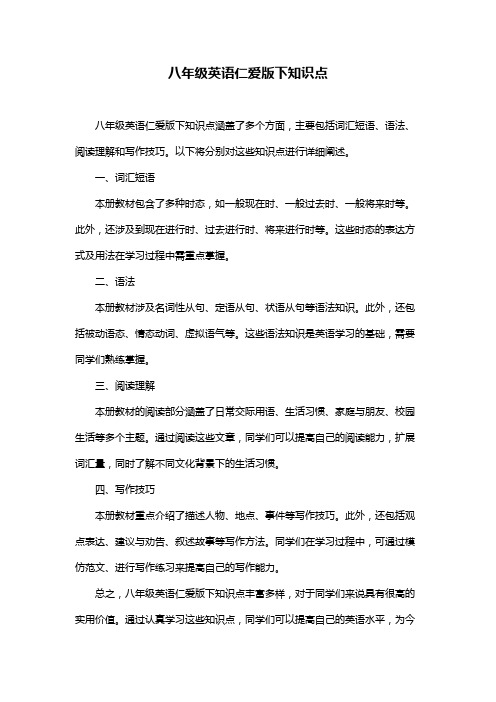
八年级英语仁爱版下知识点
八年级英语仁爱版下知识点涵盖了多个方面,主要包括词汇短语、语法、阅读理解和写作技巧。
以下将分别对这些知识点进行详细阐述。
一、词汇短语
本册教材包含了多种时态,如一般现在时、一般过去时、一般将来时等。
此外,还涉及到现在进行时、过去进行时、将来进行时等。
这些时态的表达方式及用法在学习过程中需重点掌握。
二、语法
本册教材涉及名词性从句、定语从句、状语从句等语法知识。
此外,还包括被动语态、情态动词、虚拟语气等。
这些语法知识是英语学习的基础,需要同学们熟练掌握。
三、阅读理解
本册教材的阅读部分涵盖了日常交际用语、生活习惯、家庭与朋友、校园生活等多个主题。
通过阅读这些文章,同学们可以提高自己的阅读能力,扩展词汇量,同时了解不同文化背景下的生活习惯。
四、写作技巧
本册教材重点介绍了描述人物、地点、事件等写作技巧。
此外,还包括观点表达、建议与劝告、叙述故事等写作方法。
同学们在学习过程中,可通过模仿范文、进行写作练习来提高自己的写作能力。
总之,八年级英语仁爱版下知识点丰富多样,对于同学们来说具有很高的实用价值。
通过认真学习这些知识点,同学们可以提高自己的英语水平,为今
后的学习打下坚实基础。
在学习过程中,要注重理论与实践相结合,及时巩固所学知识,不断提高自己的听、说、读、写能力。
八年级下册仁爱版英语知识点
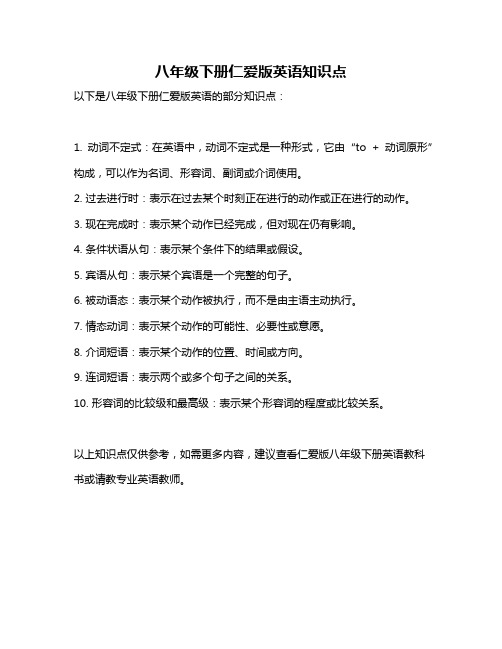
八年级下册仁爱版英语知识点
以下是八年级下册仁爱版英语的部分知识点:
1. 动词不定式:在英语中,动词不定式是一种形式,它由“to + 动词原形”构成,可以作为名词、形容词、副词或介词使用。
2. 过去进行时:表示在过去某个时刻正在进行的动作或正在进行的动作。
3. 现在完成时:表示某个动作已经完成,但对现在仍有影响。
4. 条件状语从句:表示某个条件下的结果或假设。
5. 宾语从句:表示某个宾语是一个完整的句子。
6. 被动语态:表示某个动作被执行,而不是由主语主动执行。
7. 情态动词:表示某个动作的可能性、必要性或意愿。
8. 介词短语:表示某个动作的位置、时间或方向。
9. 连词短语:表示两个或多个句子之间的关系。
10. 形容词的比较级和最高级:表示某个形容词的程度或比较关系。
以上知识点仅供参考,如需更多内容,建议查看仁爱版八年级下册英语教科书或请教专业英语教师。
仁爱版英语八年级下册Unit5知识点归纳
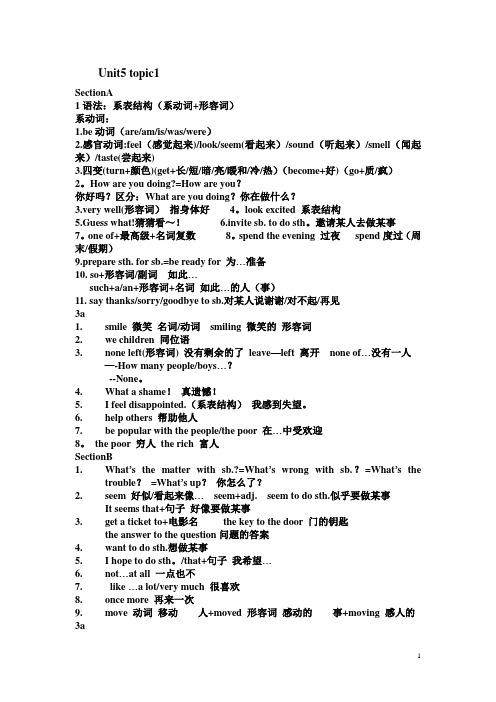
Unit5 topic1SectionA1语法:系表结构(系动词+形容词)系动词:1.be动词(are/am/is/was/were)2.感官动词:feel(感觉起来)/look/seem(看起来)/sound(听起来)/smell(闻起来)/taste(尝起来)3.四变(turn+颜色)(get+长/短/暗/亮/暖和/冷/热)(become+好)(go+质/疯)2。
How are you doing?=How are you?你好吗?区分:What are you doing?你在做什么?3.very well(形容词)指身体好4。
look excited 系表结构5.Guess what!猜猜看~!6.invite sb. to do sth。
邀请某人去做某事7。
one of+最高级+名词复数8。
spend the evening 过夜spend度过(周末/假期)9.prepare sth. for sb.=be ready for 为…准备10. so+形容词/副词如此…such+a/an+形容词+名词如此…的人(事)11. say thanks/sorry/goodbye to sb.对某人说谢谢/对不起/再见3a1.smile 微笑名词/动词smiling 微笑的形容词2.we children 同位语3.none left(形容词) 没有剩余的了leave—left 离开none of…没有一人—-How many people/boys…?--None。
4.What a shame!真遗憾!5.I feel disappointed.(系表结构)我感到失望。
6.help others 帮助他人7.be popular with the people/the poor 在…中受欢迎8。
the poor 穷人the rich 富人SectionB1.What’s the matter with sb.?=What’s wrong with sb.?=What’s thetrouble?=What’s up?你怎么了?2.seem 好似/看起来像…seem+adj. seem to do sth.似乎要做某事It seems that+句子好像要做某事3.get a ticket to+电影名the key to the door 门的钥匙the answer to the question问题的答案4.want to do sth.想做某事5.I hope to do sth。
- 1、下载文档前请自行甄别文档内容的完整性,平台不提供额外的编辑、内容补充、找答案等附加服务。
- 2、"仅部分预览"的文档,不可在线预览部分如存在完整性等问题,可反馈申请退款(可完整预览的文档不适用该条件!)。
- 3、如文档侵犯您的权益,请联系客服反馈,我们会尽快为您处理(人工客服工作时间:9:00-18:30)。
仁爱版八年级下期末总复习资料Unit 5 Feeling excited.Topic 1 You look excited.一、句子的成分(七个)。
1.句子的成分:主语,谓语,宾语(直接宾语,间接宾语),表语,宾语补足语,定语,状语。
(其中,主语和谓语是句子的主体成分)2.句子开头第一个字母必须大写,结尾要有句号“.”,问号“?”或感叹号“!”二、基本句型(五种)。
1.主语:主语是句子中的中心主题部分;一般由名词,代词,不定式,动名词(V-ing)等来充当;一般位于句首。
2.谓语(动词):与主语密切相关的动作或状态;由动词来充当;谓语通常位于主语后。
3.宾语:宾语是动作行为的对象;一般由名词,代词,数词,不定式,动名词(V-ing)来充当;和谓语动词一起说明主语做什么;宾语通常位于谓语后。
4.表语:解释,说明主语所处的性质或状态;一般由形容词,名词,不定式,动名词(V-ing),介词短语,副词等来充当;表语一般位于系动词之后。
句型结构《一》:主语+谓语+宾语。
(主语和谓语在人称和数上保持一致)She likes English.句型结构《二》:主语+系动词+表语。
系动词:be (am, is, are), feel, look, taste, smell, sound(get, become, go, turn, seem)形容词:excited, delicious, wonderful, happy, disappointed You look excited. 你看起来很兴奋They feel happy. 他们觉得快乐Section A/B1.invite … to … 意为“邀请…去…”My father and my mother want to invite your parents to go to the movies.我的父亲和母亲想要邀请你的父母亲去电影院。
2.How are you doing? 你最近好吗?相当于How are you?Very well. Thank you. 我很好,谢谢。
3.How do you feel? 你觉得怎样?I feel happy.How do the flowers smell? 那些花闻起来怎样?They smell nice.4. On my way home 在我回家的路上On my way here 在我来这的路上5.be going to do sth. 打算做某事。
They are going to see the Sound of Music.他们打算去看《音乐之声》。
What movies are they going to see?6.“one of + 名词复数” 表示“……之一”Kangkang is one of my best friends.7.prepare sth for sb. 为某人准备某物My mom will prepare some delicious food for us.8.say thanks / sorry to sb. 对某人说谢谢/对不起。
Please say thanks to your mom for us. 请为我们向你的妈妈说声谢谢。
9.be not able to do sth 不能够做某事a ticket to … 意为“……的票”He was not able to buy a ticket to the Sound of Music.10.What’s wrong with you? 相当于What’s the matter with you? 你怎么了?11.a little 一点儿 a lot 很,非常 a lot of 许多,大量not … at all 根本不He seems a little unhappy. 他似乎有一点儿不开心。
My parents like Beijing Opera a lot. 我父母亲非常喜欢京剧。
12.excited/exciting, interested/interesting,V-ing 形式形容物V-ed 形式形容人。
Section C/D1.The father was lonely and often become angry because of the noisy children.这位父亲很孤独并且经常因为孩子的吵闹而发怒。
(1). lonely 意为“寂寞的”强调情感上的孤独,而alone 意为“ 独自一人的,单独的”,I’m alone, but I’m not lonely. 我独自一人,但我并不寂寞。
(2). because of 和because 意思均为“因为”但because of 只能接名词,代词或名词短语,而because接一个句子。
He didn’t come to school because of the bad weather.We lost the game because we didn’t do our best.2.cheer sb up 使某人振奋。
cheer sb on 为某人加油。
The good news cheers Chinese up. 那个好消息使中国人振奋。
3.care for 、look after 、take care of 照顾,照料e into being 产生,形成。
Beijing Opera came into being after 1790. 京剧产生于1790年以后。
5.be full of “充满”Beijing Opera is full of many famous stories. 京剧充满着许多有名的故事6.agree with sb 同意某人I don’t agree with you. 我不同意你(的观点)7. a way to do sth 一种做什么的方式,make peace with sb 与某人和睦相处They find a way to make peace with each other. 他们寻找一种和睦相处的方式。
ed to do sth 过去常常做某事be popular with sb 受到某人的欢迎Beijing Opera used to be popular with old people. 京剧常常受到老年人的欢迎。
9.be interested in 对…感兴趣More young people are becoming interested in Beijing Opera.更多的年轻人正变得对京剧感兴趣。
Topic 2 I’m feeling better now.Section A1.What seems to be your problem? 出了什么问题?seem to do … 意为“似乎……;看来……”He seems to like me.It seems + that从句,意为“似乎……;好像……”具有不确定性。
It seems that you don’t like swimming. 你似乎不喜欢游泳。
做系动词,接形容词作表语。
Mr. Brown seems a little unhappy.2.She is very strict with herself. 她对自己要求非常严格。
be strict with sb. 对某人要求严格be strict in sth. 对某事要求严格You should be strict in your study.3.She feels very lonely because she has no friends to talk with.她觉得非常寂寞,因为她没有可以交谈的朋友。
She has no friends. 相当于She doesn’t have friends. 她没有朋友to talk with 不定式短语作后置定语,修饰friends.talk about 谈论What are you talking about? 你们正在谈论什么?talk to / with sb. 与某人谈话have a talk 谈一谈I think I should have a talk with her. 我认为我应该和她谈一谈。
4.I’m really worried about her. 我真的很担心她。
be worried about 对……感到很担心be interested in 对……感兴趣be sorry for 对……感到抱歉/难过be angry with sb对……感到生气be pleased with对……感到高兴be afraid of 对……感到害怕5.Thank you for sth / for doing sthThank you for your help.Thank you for telling me.6.do well in 在…方面做得好do badly in 在…方面做糟糕7.take it easy “放松;别紧张” ,It doesn’t matter “没关系”Section B1.How are you feeling today? 你今天觉得怎么样?I’m feeling really sad because I failed the English exam.fail 意为“未通过;不及格”fail to do sth 意为“做…失败”Doctors fail to save the girl’s life.2.at one’s age “在某人这个年纪时”Everyone gets these feelings at your age.at the age of five “在某人五岁时”, 相当于when he was five3.There, there!好啦,好啦;相当于Don’t worry. It’s all right. It’s OK.4.make friends with sb 和某人交朋友Who do you want to make friends with? 你想要和谁交朋友?5.be sure (that) 确定…… be sure to do sth . be sure of (doing) sth.I’m sure (that) she would like to be your friend. 我确定她想要做你的朋友。
be not sure whether / if 不确定是否I’m not sure whether / if she will come. 我不确定是否她将会来。
